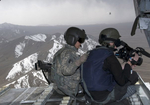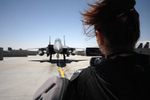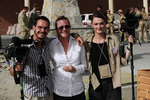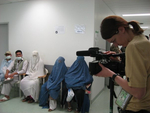Weaving stories on the frontline
“Please don’t let me die like Elvis,” was all that NATO TV video journalist and producer Melissa Preen could think when nature caught her off-guard during a gun battle with the Taliban.

A surprise rocket attack during her embed with a 12-man squad of US soldiers one night in Wardak, Afghanistan, left her little time to do anything other than capture the battle on camera, listen to her heart pounding and cross her legs.
“All hell was unleashed on the hillside where the rocket was fired from,” she says. “Being shot at is something most people will not have to experience, but…I can honestly say, I didn’t know if I was more scared or excited.”

With adrenalin pumping, heart pounding and camera rolling, Preen did her best to capture the battle for 20 minutes before having to drop everything and run to the makeshift toilet as rockets landed around her.
All I could think of was how Elvis died, she laughs adding that she felt guilty for needing the toilet. It’s the picture which illustrates exactly what the soldiers on the ground see and experience, she says, “So you actually feel guilty if you fail to get the action on tape.”
Dreaming of action
Although Preen has always wanted to be a war correspondent, her colleague Ruth Owen never had a desire to emulate Kate Adie, even though she admired her work.

When Owen found herself in Kabul, Afghanistan, after taking up the challenge to hone her journalistic skills, she hadn’t imagined a life that would include a vibrant capital city where she spent her spare time mentoring local rock bands.
“[Being in Afghanistan] I’ve seen a lot of the ‘ambulance chasing’ behaviour demanded of journalists by their editors back home,” says Owen adding that often this means nothing more than bomb-blasts and fighting are reported. “It’s definitely turned me toward more feature-based journalism, where you have the chance to tell the full story…That’s what’s important and I try to never forget; as a journalist you’re there to tell other people’s stories.”
A woman in a man’s job

The intense environment attracts some of the industry’s best journalists – male and female – to the adrenaline junkie life, placing them in the frontline of news production.
“It is definitely an advantage being a [Western] woman in the south of Afghanistan,” says Owen. “The more conservative Afghans tend to view you as a ‘third gender’ – neither woman nor man. This means you are generally ignored making it much easier to get closer shots.”
This isn’t the case in the north however, where Owen admits to receiving a number of unwelcome marriage proposals.
While filming Afghan police officers at training school, Preen says she attracted an unusual amount of attention from recruits which ruined her camera shot. Later, as the group lined up on the firing range to practice, the leader turned his loaded AK-47 toward her head and started laughing.
“I lost it,” she says. “I went mental. I was calling him all the colourful four letter insults, but what really annoyed me was that his mentors never reprimanded him.”
In another instance a male member of Afghanistan’s parliament gave her an interview then asked her to stay the night and have breakfast in the morning. “I don’t think my male colleagues would have been offered the same hospitality,” Preen says, “Needless to say, I declined.”
Such situations are part of the job. “If you don’t like being gawped at, forget working in Afghanistan,” she says. “It’s what the majority of the Afghan male population do here. From police at checkpoints to waiters in restaurants. Western women attract a lot of stares.”
Access to local women

One advantage of being a woman however is that both journalists have greater access to local women.
After a prolonged negotiation with village elders, Owen gained access to some local women staying in a well-fortified house. “They shuffled in all burqa-clad and silent, then once the door was shut, threw off their robes and started shouting, laughing and generally making a wonderful noise,” she explains.
Not making assumptions about people is one of the key things Afghanistan has taught me, she adds. To the outside world these women appear demure, but it doesn’t mean that they don’t rule the roost inside the house, she says.
“It upsets me to see women covering themselves up,” says Preen. “I sat down with a group of Afghan females a few days ago and I asked why one of them was wearing the burqa. She said her father told her she had to. She hates it, it makes her dizzy and she’ll often faint.”
Changing perceptions
Although many of the anecdotes revealed by the women are humorous, they both admit that being a woman on the frontline can be difficult. The military can be obstructive towards embedding female journalists in so-called ‘hot zones,’ says Owen, who’s own embed was diverted to a more peaceful area of the country a year ago.
“I was a gadget journalist before coming to Afghanistan,” says Owen. “So now…it’s bigger boys and bigger toys.” Proving yourself has always been key to avoiding sexism anywhere in the industry she adds.
Preen agrees, adding that sometimes, putting a woman on the frontline endangers soldiers, whose natural instincts are to protect them. That said, she adds, “I like to remind the patrol that I’m a woman, not someone with special needs.”
